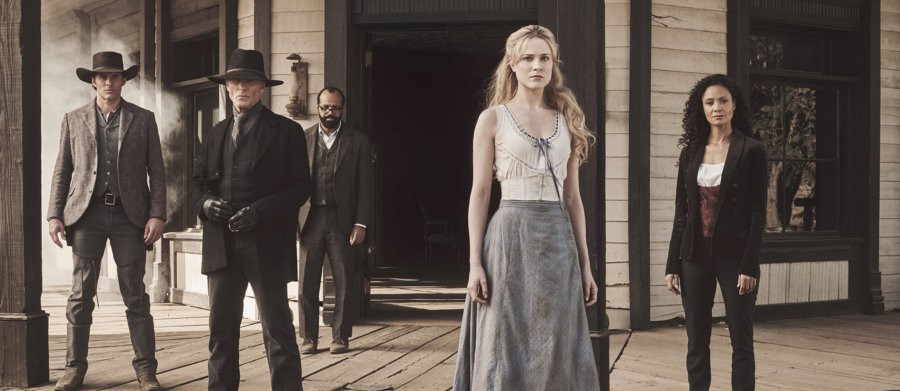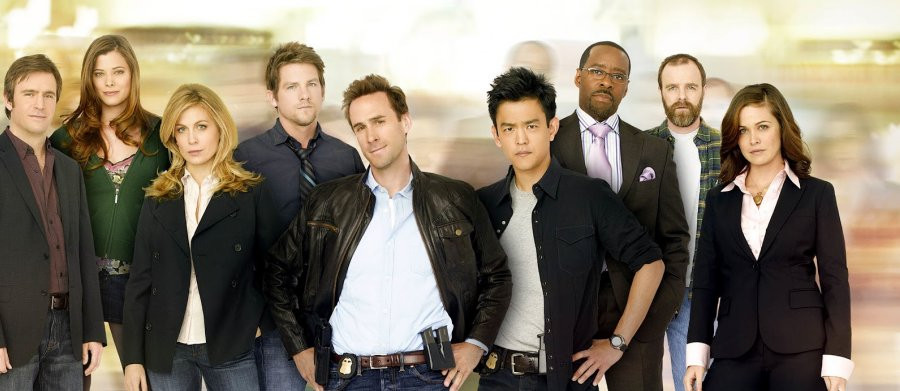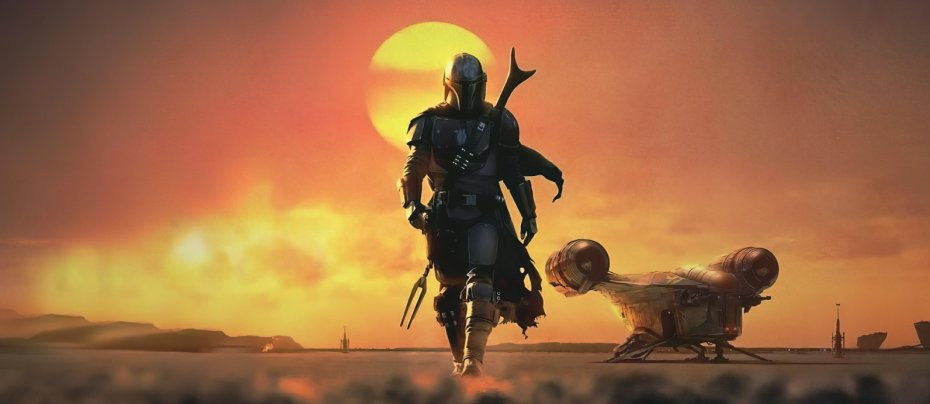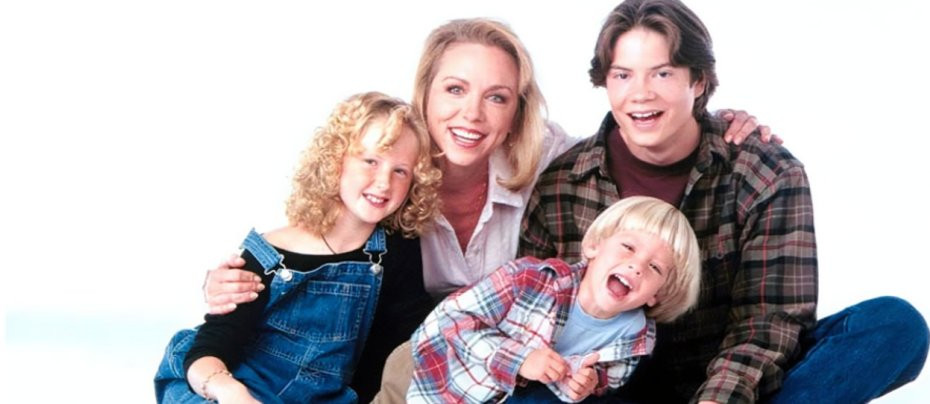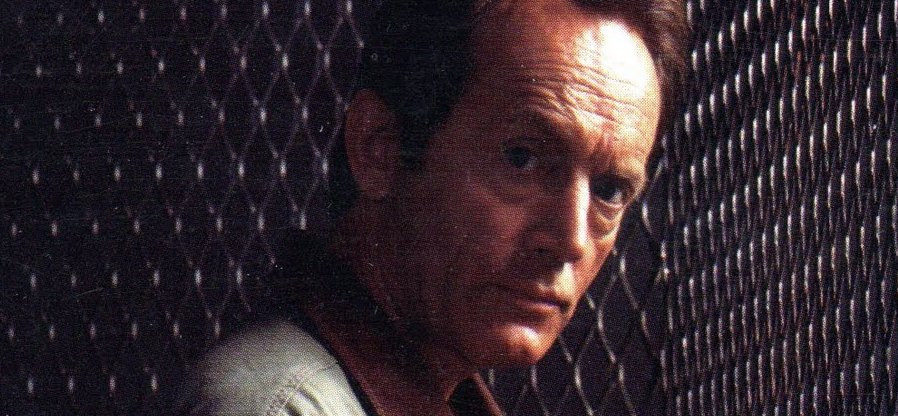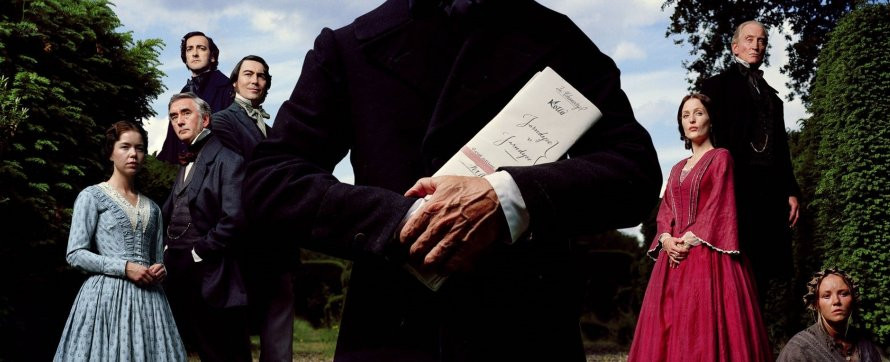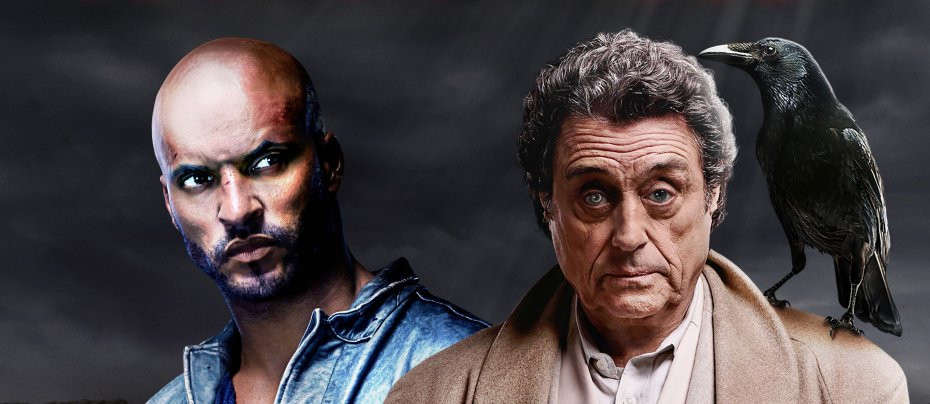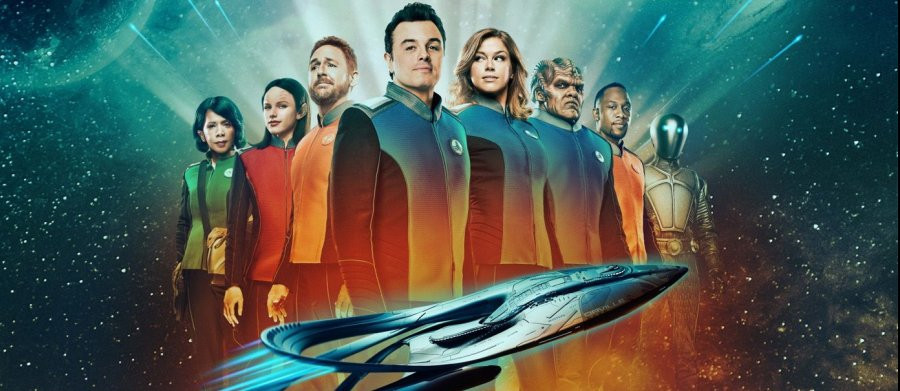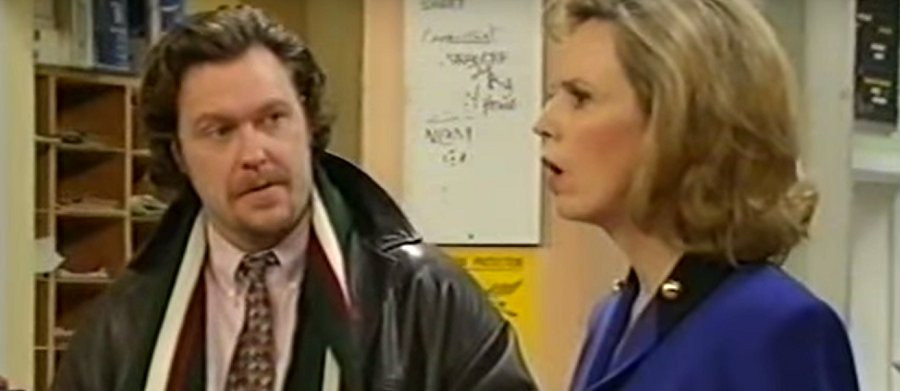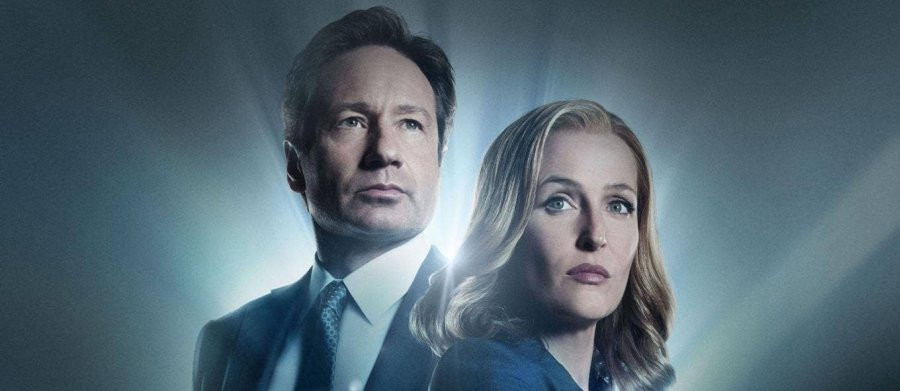
The X-Files
1993 - United StatesThe Truth is Out There
X-Files review by Daniel Tessier
The X-Files first aired in September 1993 in the States; for the UK, save some limited satellite showings, it was a full year later. By the time it arrived on the BBC, it was already a talking point. I was ten – just a bit too young to really be watching something like this, but absolutely the right age to want to watch it. It had everything: aliens, monsters, creepy-as-hell mysteries and quotable taglines. In the early nineties, even that title sequence seemed cool, and not, as it clearly is, hilariously naff.
The series was an early example of what I like to call a para-procedural: a programme which has the setting and structure of a procedural drama, but with paranormal or fantastic elements. It was far from the first; series creator Chris Carter cites Kolchak: The Night Stalker, a 1974-5 series that combined crime investigation and the paranormal, as a huge influence. Other series that inspired The X-Files include genre classic The Twilight Zone, and police procedurals including the long-running British series Prime Suspect. The greater inspiration, though, was real life: the political corruption of the Watergate scandal, documented murder cases, and a report that 3.7 million Americans believed they had been abducted by aliens.
All this came together in The X-Files, based on the premise of a special department of the FBI that investigated unsolved and inexplicable cases. Using the FBI allowed a national and sometimes international scope to the series, preventing from the stories stretching credibility too far by having everything occur in one location. Carter pitched the series to Fox twice before they accepted it, and the network interfered with his vision for the show considerably during early production. While Carter, as creator, oversaw the direction of the series, he had no overall plan for the ongoing plotlines at the beginning. Instead, he and his writers worked things out on the fly – the art of serialised television being to make it look like you had a plan all the time, even though you were making it up as you went along. It's unlikely Carter would have been able to script an entire American network season alone, and he employed several staff writers, with Howard Gordon and Alex Gansa being the main contributors. This helped keep the flow of ideas fresh and inventive.
Revolving around two leads kept the show tight. The X-Files would be investigated by two agents – a believer and a sceptic, one male and one female. Most writers would make the woman the believer, but Carter wrote them the other way around. Fox "Spooky" Mulder was a once well-regarded agent with considerable experience in criminal profiling, but had become a pariah due to his obsession with the X-Files and unexplained phenomena. Driven by the vanishing of his sister when they were both children – something he believes was an alien abduction – Mulder is determined to uncover the truth at all costs. Dr. Dana Scully, on the other hand, is a medical doctor and forensic pathologist who also has a degree in physics. Unlike the credulous Mulder, Scully began as a closed-minded empiricist, with the exception of her Roman Catholic beliefs. Scully was modelled somewhat on Clarice Starling in The Silence of the Lambs, although there are also considerable similarities to Professor Elizabeth Shaw in the UNIT years of Doctor Who. Carter was keen to keep the relationship between the leads platonic, citing Steed and Peel in The Avengers as a model for their relationship, although a "will they/won't they?" interest developed quickly among fans.
David Duchovny had been a screen actor for some years before auditioning for Mulder. Aside from a small role on Twin Peaks (another influence on the series), he had largely done film work, but was still a bit part actor. Carter and the casting director considered his audition "brilliant" and while contractually two actors had to be shortlisted for Fox to choose from, there was no other serious contender. Casting Scully was more of a battle. Gillian Anderson was largely a stage actor, having very limited film experience and no television experience before auditioning for the series. The Fox executives wanted either a more recognisable lead or a more conventional "bombshell" type – preferably both. Anderson's understated and intelligent audition won Carter over immediately and he had to fight the network to have her cast. Now, it's impossible to imagine anyone else in the lead roles, and the series made stars of Duchovny and Anderson, not to mention international sex symbols.
The first season quickly settled into a pattern of mixing "mythology" and "monster-of-the-week" episodes. "Mythology" episodes dealt with the ongoing story of a government conspiracy that hid the truth of alien contact, providing a spine for the series that would last throughout its entire run. Having these comprise the entire series would have led it to run out of steam quickly, so the decision to include standalone "monster-of-the-week" stories was made quickly. These rapidly became more popular with fans; they were certainly the ones I and fellow young fans talked about and looked forward to far more. Early on, Carter planned to have a third strand, featuring hoaxes and mundane explanations, but these were almost entirely dropped once production began.

The series kicked off with a pilot episode that set up the premise of the series quickly and simply, with Scully being foisted on Mulder to keep an eye on him and provide him with perspective. Their first case involves them investigating a series of deaths that Mulder believes are linked to alien experimentation. The episode introduced several apparently minor characters who would go on to be much more significant: Zachary Ansly as abductee Billy Miles, Charles Cioffi as Scott Blevins, briefly the agents' immediate superior, and William B. Davis as the Cigarette Smoking Man, aka Cancer Man. The latter would go on to be the most significant adversarial character in the series, but you wouldn't guess it from his first appearance: he's completely silent, just watching the developments and at the end of the episode, confiscating evidence to be lost within a gigantic storage facility. He only says four words in the whole of the first season, yet his presence is remarkably powerful. His rise from little more than an extra to the main antagonist is pretty amazing.
Rewatching the season again, over thirty years later, it's remarkable how well most of it holds up. By modern standards, some of the scares seem rather tame – much of which is down to network meddling to tone it down – but when it works, by god it's chilling. Some episodes are a touch slow, but that's more a consequence of the accelerating pace of television drama. At the time, these were gripping – and adult viewers thought so too, so it wasn't just because I was ten! While the series is clearly intended for an adult audience, Fox obviously realised the appeal it had for young viewers; it wasn't long before junior novelisations were released to cash-in on the property. Considered a cult hit, with good but not exceptional ratings, the first season made enough of an impact that a second season was assured.

"Trust no one." Those were Deep Throat's last words when he was assassinated in the first season finale, and in season two, they really are words to live by. The second season of The X-Files ramped up the conspiracy storyline and added new layers to the series' mythology. The second season introduced Mitch Pileggi as Assistant Director Walter Skinner, the supervisor of the X-Files office and Mulder and Scully's main superior. While considered a guest character in the first season, he would increase in importance as the series went on. Calm, collected but dynamic and in-control, Skinner was a class act from the beginning and his presence added a vital element to the series. The standalone episodes also added another level of paranoia and mistrust.
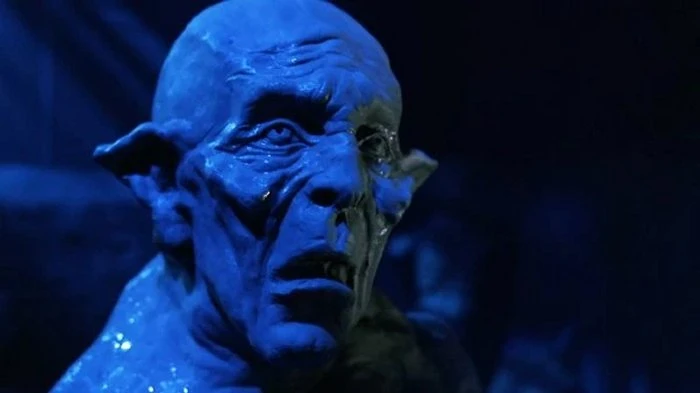
The third season continued very much in the vein of the second, following up and building on the ongoing conspiracy backstory while playing with new paranormal concepts. While the series was already beginning to show signs of becoming formulaic, some of the episodes of the season played around with the format. By now, the series had enough of a regular format in place to allow the writers to play around and parody their own material. The fourth saw the series reaching the height of its popularity, and is one of the strongest of the series' run.

The fifth season saw the series reach the pinnacle of its success. Before production on the season even began, the cast and crew were filming the first X-Files movie (officially titled simply as The X-Files, or The X-Files: Fight the Future in some territories). While filmed before the series, the movie was set afterwards, which meant that the season had an explicit end point to work towards. The original plan was for the series to end with the fifth season, moving into a movie franchise (as an echo of this, the final episode of the season is named "The End"). However, the series' success worked against it in this respect. The highest-rated season of the entire series, this season showed that The X-Files as a television show was just too much of a moneymaker for Fox, and a sixth and seventh season were rapidly greenlit to follow the film. This was, arguably, a mistake, and the series never really reached the heights of its first five seasons.
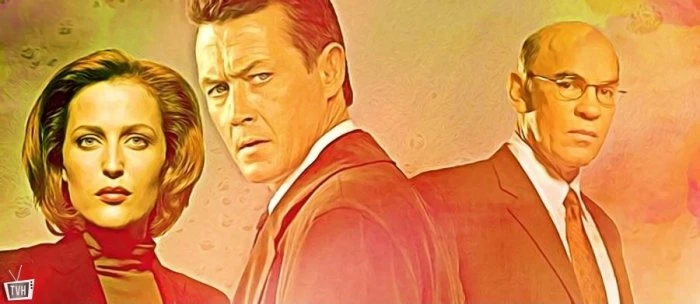
The eighth season brought the series into the twenty-first century with the proverbial kick up the backside that it needed. After seven years of paranormal investigations for Mulder and Scully, the departure of David Duchovny as a regular cast member forced the showrunners to make big changes to the series, which gave the waning show a late-in-the-day caffeine boost. The ninth season saw the programme move further away from its original set-up than ever before. Yet, where it could have reached out in a new direction, and tried something bolder, it was just more of the same. Mulder's replacement as Scully's partner is Agent John Doggett. Played by Robert Patrick, then best known as the villainous T-1000 Terminator 2: Judgment Day, Doggett is a stark contrast to Mulder; a hard-nosed, stern-faced policeman, an ex-marine with a more aggressive, and with more of a no-nonsense attitude than either Mulder or Scully ever displayed.
Annabeth Gish was the final major player to be added this season, being set up to take over as the main female field agent in the ninth season. Reyes, who specialises in ritualistic crimes and cults, is refreshingly open-minded yet sensibly sceptical. The season finale set up the the show for a very different dynamic with the new X-Files team of Dogget and Reyes ready to take the series into its final season.

The original, nine-season run of The X-Files ended in 2002, with a bang that turned out to be a whimper. In spite of a poor reception for much of its last season, the series had been a huge hit throughout its run, with a dedicated fanbase and a solid audience of more casual viewers. At its height it was one of 20th Century Fox's highest earners. So it was inevitable that The X-Files would continue, in some shape or form, some day. The franchise's first return to the screen was in cinemas. The X-Files: I Want to Believe hit screens in summer 2008, the second cinematic outing for Mulder and Scully, with David Duchovny and Gillian Anderson.
Season Ten brought back the classic team of Mulder and Scully to lead the show. Long since separated from the romantic relationship in which they'd ended the main series, the former FBI agents are not so much estranged as moving in wholly different directions. Scully, whose career with the Bureau always seemed like a side-step from her medical career, had returned to medicine full-time as a children's surgeon, Mulder, in the mean time, had become more reclusive than ever, remaining as eccentric and obsessive as he always was, albeit somewhat more cynical to people's tall stories.

The final episode leaves possibilities open for Mulder and Scully's ongoing relationship, while seemingly drawing a line under the conspiracy plotline at long last. If the series is ever revived – and stranger things have happened – it's unlikely that it will actually continue in this direction. Anderson has made it clear that she is done with Scully, and while Duchovny has expressed potential interest, it's hard to see the character continuing as lead indefinitely. Reworking his character as a mysterious, patrician role for a new generation of agents could give the series a new lease of life. Carter has changed his mind more than once concerning whether he'd continue the series without Anderson.
Heretical as it is to say, the best way forward, if the series were to be revived again, would be to give it to a new creative team and a new cast. Much of the strongest material in these seasons has been by writers and directors new to the programme, who have proven The X-Files still has the capacity to be new and inventive. Most importantly of all, the conspiracy mythology, as vital as it was to the series' early years, needs to be put to bed for good, with something new to take its place.
Could The X-Files work in today's televisual landscape? Could it catch the imagination in the way it once did? I want to believe it can.
Seen this show? How do you rate it?
Seen this show? How do you rate it?
Published on March 22nd, 2024. Written by Daniel Tessier for Television Heaven.


